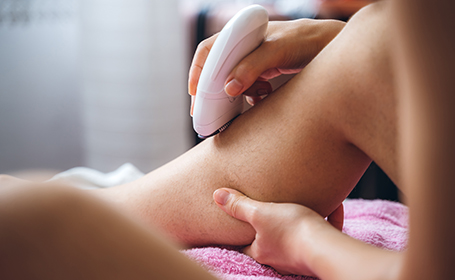
5 possible causes of excess facial and body hair
For some women, excessive hair growth on the face and body can have a devastating impact on your self-esteem and confidence
1. Polycystic ovary syndrome (PCOS) is the most common cause of excessive facial hair growth

Harvard Health states that polycystic ovarian syndrome (PCOS) is the most common cause of excessive body and facial hair growth in women. PCOS can cause high levels of androgens or male hormones in your body. These excess androgens can lead to hair growth on your buttocks, back, face and chest. Moreover, PCOS can cause irregular periods and enlarged ovaries. Other common symptoms of PCOS that you might experience include hair loss from the scalp, acne and weight gain.
Although the exact cause of PCOS is unknown, the NHS states PCOS is associated with higher levels of insulin and may be caused by genetics.
Insulin is a hormone that controls your blood sugar levels. If you have PCOS, you are more likely to experience insulin resistance. In response to this, your body produces more insulin, which triggers an increase in androgen levels such as testosterone.
2. A higher body mass index (BMI) can affect female body hair
A study published by the US National Library of Medicine shows hirsutism (excessive female body hair) was more prevalent among patients with a higher body mass index (BMI).
The study concluded overweight women were more likely to suffer from hirsutism due to increased insulin resistance and higher androgen levels. Androgens are male sex hormones. A common example of an androgen is testosterone. It is often assumed only men produce testosterone. However, according to Harvard Health, women also produce androgens such as testosterone in their ovaries and adrenal glands.
If you are overweight, the NHS recommends weight loss through diet and exercise to help control your hormonal levels.
Polycystic ovarian syndrome (PCOS) is the most common cause of excessive body and facial hair growth in women.
3. Using anabolic steroids can trigger the growth of female facial hair
Anabolic steroids are only available through prescription. These steroids work by imitating the effects of the male sex hormone testosterone.
They are sometimes used to boost athletic performance and enhance muscle mass. However, if used in this way, you can develop an addiction and other severe side effects.
If you misuse anabolic steroids, it can trigger severe psychological symptoms. These symptoms include paranoia, hallucinations, and aggressive behaviour.
4. Cushing’s syndrome could be another possible cause of excess body hair
Cushing’s syndrome is another possible cause of your hirsutism (or excessive body and facial hair). It is caused by having high levels of the stress hormone cortisol in your body.The NHS reports that Cushing’s syndrome is uncommon. The condition mostly affects people who are long-term users of steroid medication. Steroid medication contains a man-made version of cortisol, which can lead you to experience high levels of cortisol in your body.
If you have Cushing’s syndrome, the NHS states your high levels of cortisol might be the result of a tumour. But this is a rare occurrence.
This could be a tumour in your adrenal gland, which are above the kidneys or in your pituitary gland that is located in the brain. These tumours are most often non-cancerous.
Cushing syndrome can cause symptoms such as weight gain, redness and puffiness in the face and a build of fat on the back of your neck and shoulders. Other symptoms to watch out for include skin that bruises easily, weakness in your upper arms and thighs, and large purple stretch marks.

5. Acromegaly is a rare condition that is associated with excess body hair
According to the NHS, acromegaly is a rare condition that can cause hair growth on the body and face. It occurs when your pituitary gland produces excessive levels of growth hormone. The increase in growth hormones can be the cause of a tumour in your pituitary gland.
Other common symptoms of acromegaly that you could experience are abnormally large hands and feet, joint pain, headaches, fatigue and abnormal periods. People of any age can be affected. But is typically diagnosed in adults between the ages of 30 and 50.
How can you remove excess facial and body hair?
Your GP might suggest traditional hair removal methods such as waxing, plucking, shaving or bleaching to remove or lighten facial hair. They may prescribe you a cream to slow down the hair growth on your face.
Your GP might also recommend going on the contraceptive pill to help manage your hormonal levels.
Electrolysis and laser hair removal are two of the main treatments for removing unwanted hair. These are not usually offered on the NHS and results can vary for each individual.
What is the best way to remove facial hair?
But what is the best way to remove facial hair? Long-term hair removal treatments can provide relief from excessive body and facial hair. Electrolysis and laser hair removal are two of the main treatments for removing unwanted hair. These are not usually offered on the NHS and results can vary for each individual.
Electrolysis: is carried out by a dermatologist. An electric current is passed into a hair follicle through a needle. Electrolysis aims to destroy the hair follicle and prevent it from re-growing.
Laser hair removal: applies a powerful laser or intense pulsed light (IPL) to remove unwanted hair. But it is not a permanent solution and is not as effective if you have tanned skin or lighter body hair.
Do you need help for PCOS?
If you have PCOS, you might need help managing your symptoms. At Circle Health Group, we have a network of consultant gynaecologists who can help you manage your symptoms with the best treatment plan for you. You can book an appointment with a consultant online today.
Tags
How do I book an appointment?
If you're concerned about symptoms you're experiencing or require further information on this subject, talk to a GP or see an expert consultant at your local Circle Hospital.